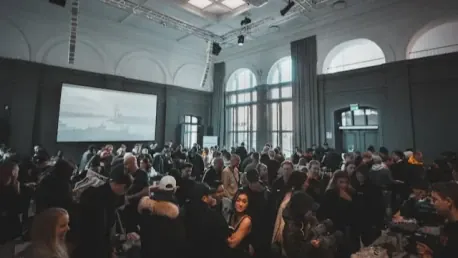The events industry has undergone significant transformations over the past few years, driven by technological advancements, changing consumer preferences, and the aftermath of the global pandemic. As we look ahead to 2025, several key trends are poised to shape the future of events, offering new opportunities and challenges for industry professionals. A renewed focus on personalization, sustainability, and the integration of cutting-edge technology are at the forefront of these developments. Additionally, there is a growing emphasis on early planning, cost management, community building, and the transformation of bridal fashion. Understanding these trends will help event planners and industry professionals navigate the evolving landscape and create innovative and impactful experiences for their clients.
The Rise of Personalization in Events
One of the most prominent trends shaping the events industry in 2025 is the emphasis on personalization. Attendees now expect events to be tailored to their individual preferences and interests, which has led to a demand for unique and customized experiences. Event planners are finding innovative ways to make each event feel special and memorable, from personalized invitations and bespoke menus to tailored entertainment and interactive activities. The goal is to create an atmosphere that resonates with attendees on a personal level, enhancing their overall experience and satisfaction.
Technology plays a crucial role in enabling this shift towards personalization. Advanced data analytics and AI-driven tools allow event organizers to gather insights about attendees’ preferences and behaviors, enabling them to create highly targeted and relevant experiences. This approach not only enhances attendee satisfaction but also drives higher engagement and loyalty. By leveraging these technological advancements, event planners can better understand their audience and deliver customized experiences that exceed expectations. As a result, personalization has become a cornerstone of modern event planning, setting the stage for more meaningful and engaging events in the future.
Sustainability and Eco-Friendly Practices
Sustainability has emerged as a critical focus for the events industry, driven by growing awareness of environmental issues and the need to reduce the industry’s carbon footprint. Event organizers and attendees alike are prioritizing eco-friendly practices, resulting in the increasing use of sustainable materials, zero-waste initiatives, and locally sourced, plant-based menus. These efforts not only help minimize environmental impact but also resonate with the values of environmentally conscious attendees, creating a positive association with the event.
Green technologies are also being adopted to reduce the carbon footprint of events. From energy-efficient lighting and digital ticketing to virtual and hybrid event formats, sustainable practices are becoming integral to event planning. For instance, virtual and hybrid events allow for greater flexibility and accessibility, reducing the need for travel and associated emissions. As sustainability continues to be a key consideration for clients, event professionals are finding creative ways to incorporate eco-friendly elements into their planning processes. By embracing these sustainable practices, the events industry can contribute to a more environmentally responsible future while still delivering high-quality experiences.
Technological Integration and Innovation
The integration of technology is revolutionizing the events industry, with innovations enhancing every aspect of event management. One notable trend is the use of AI-powered planning tools, which streamline event planning processes and improve efficiency. Tools such as image recognition and automated scheduling save time and reduce the workload for event professionals, allowing them to focus on creativity and client satisfaction. These advancements are empowering small business owners and event planners to achieve more with less effort, ultimately enhancing the overall quality of events.
Virtual and hybrid events have also gained popularity, offering flexibility and accessibility to a wider audience. Leveraging advanced streaming technologies and interactive platforms, these formats create immersive experiences that bridge the gap between physical and digital attendance. Attendees can participate in events from the comfort of their homes while still engaging with the content and other participants. As technology continues to evolve, we can expect even more innovative solutions that will redefine the way events are planned and executed. The integration of technology not only enhances efficiency and engagement but also opens up new possibilities for creativity and innovation in the events industry.
The Evolution of Bridal Fashion
Bridal fashion is undergoing a significant transformation, with modern brides seeking unique and meaningful attire that reflects their personal style and values. There is a growing preference for historical and vintage-inspired pieces that tell a story, adding depth and significance to the bridal ensemble. This trend extends to the bridal party, with family members also embracing fashion choices that emphasize intention and artistry. The focus is on creating bespoke looks that are both timeless and contemporary, resonating with the personal experiences and values of the bride and her loved ones.
Brides are increasingly interested in the “why” behind their selections, opting for garments that resonate with their values and experiences. This shift towards purposeful fashion creates new opportunities for designers and stylists to collaborate with brides in crafting bespoke looks that are both unique and meaningful. By incorporating historical or vintage elements, designers can create pieces that are not only visually stunning but also rich in narrative and significance. This evolution in bridal fashion highlights a broader trend towards intentionality and storytelling, making the bridal attire an integral part of the overall event experience.
Early Planning and Cost Management
In the context of rising costs and high demand for event services, early planning has become more critical than ever. Securing audiovisual (AV) needs well in advance is essential to guarantee the best rates and availability of seasoned professionals. The post-pandemic surge in event activity has led to increased competition for resources, making early planning a vital strategy for successful event execution. By booking AV requirements and other key services ahead of time, event planners can avoid last-minute challenges and ensure a seamless experience for their clients and attendees.
Early planning not only helps in managing costs but also provides event planners with the opportunity to focus on creativity and innovation. With the logistical aspects accounted for, planners can dedicate more time and energy to designing unique and memorable experiences. This proactive approach is essential in a high-demand environment, where securing resources in advance can make the difference between a successful event and a logistical nightmare. By prioritizing early planning and cost management, event professionals can navigate the evolving landscape and deliver exceptional events that meet the high expectations of their clients.
Community Building and Collaboration
Collaboration and community building are becoming increasingly important in the events industry, as professionals work together to share resources, ideas, and expertise. This collaborative spirit fosters a sense of community that drives innovation and creativity, ultimately elevating the overall quality of events. The formation of industry networks and partnerships enables event planners to pool their strengths and knowledge, addressing common challenges such as resource constraints and skill gaps. By leveraging the collective capabilities of the industry, event professionals can offer more comprehensive and engaging experiences to their clients.
Community building and collaboration also create opportunities for professional growth and development. By working together, event planners can learn from each other, share best practices, and explore new ideas that push the boundaries of traditional event planning. This trend towards collaboration is helping to create a more dynamic and resilient industry, where professionals are better equipped to adapt to changing circumstances and innovate in response to new challenges. As the events industry continues to evolve, the importance of community and collaboration will only grow, driving further advancements and improvements in the way events are planned and executed.
Resilience and Optimism
The events industry has demonstrated remarkable resilience in the face of adversity, particularly in response to the challenges posed by the global pandemic. Professionals have had to adapt and innovate, leading to a renewed sense of optimism and determination. This resilience is reflected in the industry’s ability to view challenges as opportunities for growth and improvement. By embracing new technologies, sustainable practices, and collaborative approaches, the events industry has emerged stronger and more adaptable, ready to tackle future challenges head-on.
The collective experiences of the past few years have equipped the industry with valuable insights and tools needed to navigate future challenges successfully. As we move forward, the events industry is well-positioned to embrace new opportunities and drive positive change. The resilience and optimism demonstrated by industry professionals are key drivers of continued growth and innovation. By maintaining a forward-thinking mindset and a willingness to adapt, the events industry can create meaningful and impactful experiences that resonate with attendees and clients alike. The future of the events industry is bright, with endless possibilities for creativity, innovation, and success.









